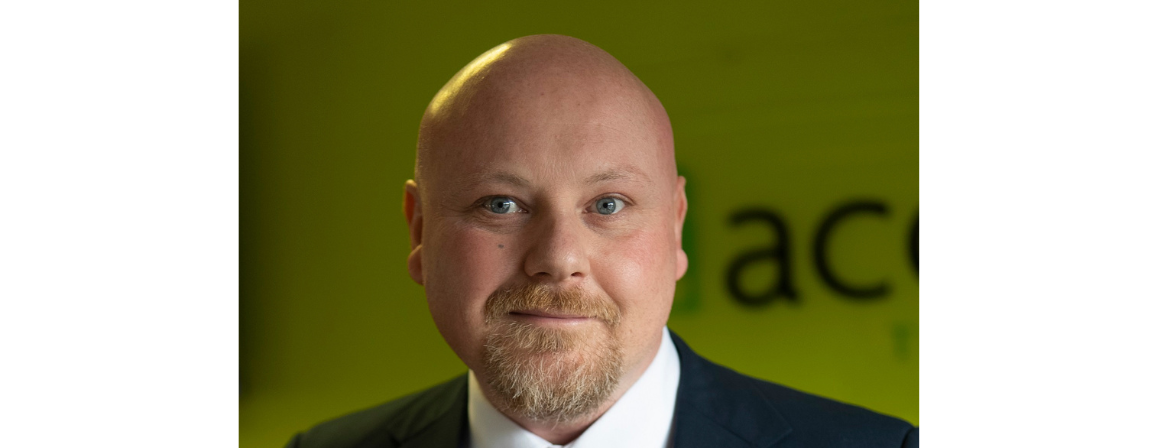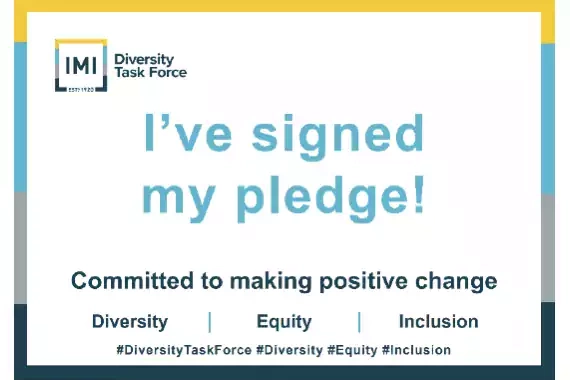Case Study: Gareth Saldanha-Fallows

Name: Gareth Saldanha-Fallows
Job Title: Founder of Acorn Training Ltd
This case study attempts to use terminology that is acceptable to under-represented groups, but we appreciate that some of what is written may be problematic. For this we apologise. As with many others, we are on a learning journey and hope that you will bear with us as we move forward together.
Acorn Training Ltd are a national training provider who deliver apprenticeships, adult learning, employability programmes, justice services, and skills and career development. The vision of the organisation is to ensure safe and secure futures for everyone to succeed in life and work, no matter their differences and backgrounds. Gareth Saldanha-Fallows founded Acorn Training in 2008.
In 2021, Acorn Training won Network of the Year Award, and by being shortlisted as a finalist at the World Skills UK Equity, Diversity & Inclusion Awards, Gareth was recognised as a role model for his work championing equality, diversity and inclusion. He is a Fellow of the IMI.
Here, Gareth talks candidly about his experiences growing up, the challenges he faced about being able to openly declare his sexuality, and the importance of allyship in the workplace.
My career journey
When I was 16 years old, my parents found out that I was gay. They didn’t react well, and I moved out of the family home. Through the Potteries Young Homeless project, I ended-up sharing a house with three other young men. I stayed there for about 9 months; it was a very frightening time for me. Their lifestyles were chaotic, which made it a stressful experience, for example, one of them was a heroin addict.
At 18 I got my own council flat and started the process of re-settlement. My education had suffered and so in 1999, I studied an extra year to achieve my A’ Levels. I knew that I had an interest in business studies and education.
In 2001, I completed my degree in Business & IT Education at Manchester Metropolitan University, gaining Qualified Teacher Status so that I could teach in secondary schools. The first year of my degree was subject knowledge-based and then in year two and year three it was school work placements.
I had a rocky time with the work placements; with issues around being a gay teacher and not ‘being out’, meant that I wasn’t able to behave in an authentic way. You need trust to be able to truly open up about your sexuality and your feelings. I found that there was a professional me, and a personal me. I had to change my own behaviour to fit in with the work environment i.e., I acted more ‘butch’, and having to do this impacted on my self-confidence and my motivation. I couldn’t be my authentic self because on a daily basis I was so worried about being bullied and was afraid of retribution.
On my last teaching work placement which was in a Catholic School, I had a bad experience; I was victimised and bullied by the Headteacher. I later found out that she had a gay son and was taking her contempt of her own situation out on me. I decided that teaching in schools was not for me and looked for something else.
I started teaching in a Further Education College, supporting adult learners with Maths (as part of the Functional Skills agenda). I then worked for the Learning & Skills Council in Staffordshire as a Basic Skills Coordinator, developing strategy to improve Maths and English. And when I was 23, I took a role as Skills for Learning Manager in a college, managing Maths and English. The College went through a restructure, and I became Head of Faculty, which was a lot of responsibility. My role included coordinating Business Studies, IT, Sport, and Key Skills.
I spent a couple of years working in the Head of Faculty role, and then started working in the private sector (Carter and Carter) – which was a cultural shock! I’d been working in education for quite a while and found that the private sector was much faster paced. But I also found that people were more understanding about my sexuality… being gay became less of an issue for me in the workplace.
The private training provider who I was working for went into administration and was bought out by Newcastle-Upon-Tyne College. During this time, I got a promotion and moved into a Senior Leadership role, and I started to consider my next career move. I decided to take voluntary redundancy and it was at this point that I knew I had the confidence and inspiration to use my experience to create my own business. As well as gaining teaching experience, I had the experience of administration and funding of education. It was serendipity that my career journey had given me these opportunities.
In February 2008, I started Acorn Training Ltd. There have been peaks and troughs in the business, but I now employ over 160 staff across 11 training centres, which are mainly based in the Midlands. Acorn Training offer training and apprenticeships, employability programmes, and the organisation also supports ex-offenders. We deliver training in 19 prisons across the Midlands and North East, helping to create further opportunities for people.
Allyship in action: Developing a values-based approach to recruitment
I was always scared of declaring my sexuality to others so openly, but since declaring my sexuality on our webpage, I’ve learned not to be afraid and have experienced the positive side of this.
We looked at our own recruitment process, we wanted to promote an inclusive workspace for potential applicants joining the business. So, we started to adopt a more values-based approach to recruitment. For example, being much more inclusive in our advertising text, welcoming and highlighting the opportunity for applicants to visit us, and exemplifying inclusivity with a standard top and tail on adverts.
By adopting this new approach, we have been able to attract a more diverse workforce, enriching our existing workforce and reinforcing our inclusive values and ethos. We’ve recruited four new LGBTQ+ employees and people are more open about being able to talk about their sexuality or that of their friends or family, citing that they want to work for Acorn Training because they can see we’re inclusive. Our organisation provides a safe and secure place for people to work, to be themselves, and to thrive.
Allyship is about nurturing people
A member of our team, Louise, is a lesbian woman. Acorn Training have championed Louise as a role model. For example, in Manchester last year she was a finalist in the Queer Student Awards. This support and recognition have helped to build Louise’s confidence and helped her to feel special. People with differences need to be able to feel special! We’ve recently nominated Louise for another local business award, she didn’t win it, but the process of representing the business has been such a positive and rewarding experience for her. Building her self-esteem and knowing that she is recognised and valued.
Our organisation creates opportunities for people to create and share stories
If you look at organisational culture, it’s about signs and symbols. Our processes and our core values create a family feel. We’ve implemented steering groups to help bring people together from across the company. For example, we have groups for Menopause, Safeguarding, Sustainability, and Equality & Diversity. Through these steering groups, people can develop and share their interests, and develop Acorn’s values. This approach minimises the opportunity for subcultures and silos to develop. For the groups to work, it’s important to ensure leadership and management buy-in, so we make sure that leaders go along to these meetings. There needs to be that demonstration of ‘buy-in’.
Allies are trusted role models
It's important that people have a trusted role model or ally, someone who they can approach for advice and support. For example, I received a message the other day from an ex-member of staff who told me that their daughter (who is trans), was feeling suicidal, and who in the community should they speak to? In a situation or crisis, people need someone trusted that they can turn to. It’s important that people are able to share their experiences and stories with others. This gives realness.
At some point in our lives, we all need an ally
When I was interviewed at Stoke-on-Trent College by the Adult Education Manager, Nell, I felt so comfortable at interview that I came out. Nell’s reaction was extremely supportive and positive. That meant that from day one of being in the job role, I was able to be myself and was therefore able to give my best.
Nell saw something in me, she gave me coaching and mentoring opportunities, and offered career guidance. Nell championed me for much of my career. I was on an equal footing from the start. I didn’t need to pretend anymore, which was a huge weight off my shoulders. I was just able to get on and do a good job.
Being an ally: appreciating different viewpoints and perspectives
Our Operations Director demonstrated allyship by fasting for Ramadan so that they could gain an appreciation of that experience through the day. A month of fasting actually made them feel very tired! Through this experience, they were able to gain a shared understanding and had improved awareness of perspectives of staff from the Muslim community who observe this holy month. Being an ally to others shows that you care.
An effective ally needs to:
- Be able to challenge the status quo and to challenge any negative behaviours
- Have high emotional intelligence – so that they can pick-up on the behaviours of others and how others may be feeling
- Have the ability to understand how their own behaviour impacts on the behaviour of others
- Be a good listener
- Be able to appreciate what makes a person unique, what makes them ‘them’? And to celebrate that and make the person feel included.
How can an organisation or business encourage allyship?
It’s about creating opportunities to develop networks within an organisation. For example, think about who you socialise with over tea or lunch breaks. Do you only mix with people from your ‘in-groups’? Or, do you make an effort to speak to people who have different backgrounds, different interests and experiences, or people who are from different groups to your own?
Create opportunities for people to come together across the business. Use the ‘onion model’ of communication. First layer; perhaps talking about yourself and your family. Second layer; talking about your interests. Third layer; talking about your background experiences and your challenges. And so on, until you reach the core, where you can talk about emotional things and make an emotional connection with others. It’s through this process that people develop a sense of trust and belonging. Networking helps people to communicate within and across the business. And networking groups help people to develop and strengthen positive working relationships within and across the business.
For networking to be successful, people need to have a safe space in which they feel able to speak up and share their stories and experiences. Creating safety is about clearly establishing ground rules and identifying expectations. People need to be able to consider their own behaviour and how they interact with others.
How full is your red balloon?
This can be a 15-minute activity. Feeling deflated? At the start of your working day, blow-up a red balloon. Then during your working day, let some air out of the balloon every time you feel that there is an issue, or that you’re demotivated, or if you’re feeling upset about something. Ask others, ‘How full is your red balloon today?’ The idea is to have a full balloon at the start of the day and a full balloon at the end of the day. This activity helps to create stories, it helps to create the culture.
The ’Manager’s Mask’
We have an away day for all new managers, and one of the activities we do is the ‘Manager’s Mask’. At Acorn Training, you wear your manager’s mask. During the activity, everyone gets creative, and people produce their own mask! It’s a powerful reminder not to allow your own behaviour to impact on others’ behaviour or to damage the reputation of the company.
During the activity, participants think about a typical day and the challenges they might encounter. How do they feel during interactions with customers, other staff, key stakeholders etc? Participants create their ‘manager’s mask’ to challenge and counter these issues. It’s a reminder that Acorn Training is a positive and inclusive place to be, so they can be positive to others.
Through this activity, managers develop an understanding of emotional intelligence and have an opportunity to reflect on and adapt their own behaviour. This activity improves awareness and creates allyship.
Are there any barriers to allyship?
- It’s important to have leadership and management buy-in
- A safe culture is needed so that people feel able to challenge
- Working in silos creates unhealthy subcultures (which can lead to bullying)
- Lack of awareness, lack of education.
People’s own lived experiences can also be a barrier to allyship. There needs to be understanding that through their own backgrounds and past experiences, some people may have had their fingers burned. The challenges and barriers that they’ve faced may be due to a protected characteristic.
Empathy and understanding are needed. People may have experienced closed doors in the past. They may have fears around disclosing something about them due to trauma that they’ve experienced in the past.
Three steps that employers could take to create a true sense of belonging in the work environment?
- Create a safe working environment, with internally generated values that everyone can contribute to and buy into. Create the safe space which allows questions to be asked. Ensure strong leadership buy-in.
- Establish a culture of respect and accountability. Where people can challenge and learn together. What is right? What is wrong? What can or cannot be said? Develop peoples’ awareness of emotional intelligence.
- Celebrate difference. Facilitate opportunities in the workplace for people to have discussions. Make the discussion about difference something that is able to happen. This gives people the opportunity to ask questions in a respectful but curious way. People need to feel comfortable and able to ask questions, because they might not have experienced that difference before. It’s about understanding what is appropriate to ask others and having the opportunity in the workplace to ask those questions in a secure and safe way.




